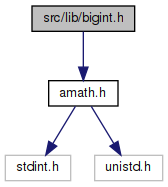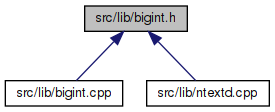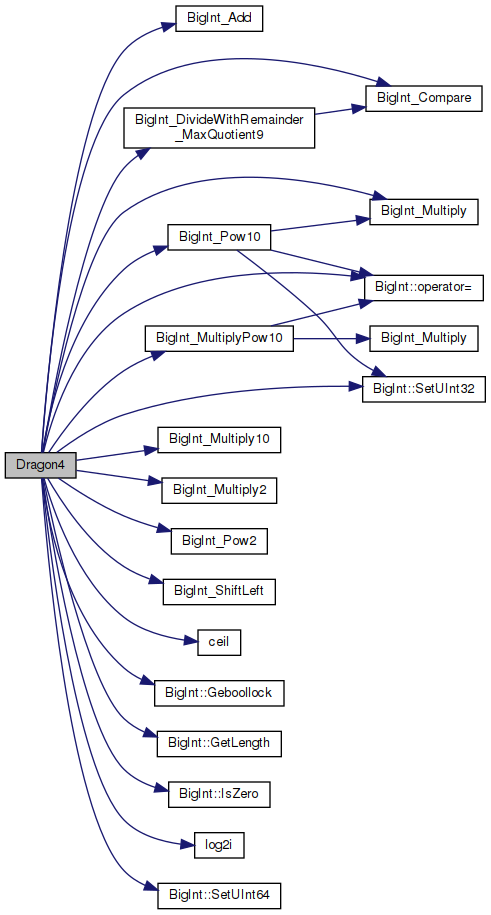bigint.h File Reference
#include "amath.h"
Include dependency graph for bigint.h:

This graph shows which files directly or indirectly include this file:

Go to the source code of this file.
Classes | |
| struct | BigInt |
Enumerations | |
| enum | tCutoffMode { CutoffMode_Unique, CutoffMode_TotalLength, CutoffMode_FractionLength } |
Functions | |
| uint32_t | Dragon4 (uint64_t mantissa, int32_t exponent, uint32_t mantissaHighBitIdx, bool hasUnequalMargins, tCutoffMode cutoffMode, uint32_t cutoffNumber, char *pOubooluffer, uint32_t bufferSize, int32_t *pOutExponent) |
Variables | |
| const uint32_t | c_BigInt_MaxBlocks = 35 |
Enumeration Type Documentation
◆ tCutoffMode
| enum tCutoffMode |
| Enumerator | |
|---|---|
| CutoffMode_Unique | |
| CutoffMode_TotalLength | |
| CutoffMode_FractionLength | |
Function Documentation
◆ Dragon4()
| uint32_t Dragon4 | ( | uint64_t | mantissa, |
| int32_t | exponent, | ||
| uint32_t | mantissaHighBitIdx, | ||
| bool | hasUnequalMargins, | ||
| tCutoffMode | cutoffMode, | ||
| uint32_t | cutoffNumber, | ||
| char * | pOubooluffer, | ||
| uint32_t | bufferSize, | ||
| int32_t * | pOutExponent | ||
| ) |
Definition at line 608 of file bigint.cpp.
References BigInt_Add(), BigInt_Compare(), BigInt_DivideWithRemainder_MaxQuotient9(), BigInt_Multiply(), BigInt_Multiply10(), BigInt_Multiply2(), BigInt_MultiplyPow10(), BigInt_Pow10(), BigInt_Pow2(), BigInt_ShiftLeft(), ceil(), CutoffMode_FractionLength, CutoffMode_TotalLength, CutoffMode_Unique, BigInt::Geboollock(), BigInt::GetLength(), BigInt::IsZero(), log2i(), BigInt::operator=(), BigInt::SetUInt32(), and BigInt::SetUInt64().
Referenced by DecimalSystem::GetText().
641 // For normalized IEEE floating point values, each time the exponent is incremented the margin also
642 // doubles. That creates a subset of transition numbers where the high margin is twice the size of
733 // This optimization is based on the paper "Printing Floating-Point Numbers Quickly and Accurately"
734 // by Burger and Dybvig http://citeseerx.ist.psu.edu/viewdoc/download?doi=10.1.1.72.4656&rep=rep1&type=pdf
736 // because that lets us take a faster branch in the code. 0.69 is chosen because 0.69 + log10(2) is
746 // floor( log10(v) ) < ceil( (mantissaHighBitIdx + exponent) * log10(2) ) <= floor( log10(v) ) + 1
748 int32_t digitExponent = (int32_t)(ceil(double((int32_t)mantissaHighBitIdx + exponent) * log10_2 - 0.69));
static void BigInt_ShiftLeft(BigInt *pResult, uint32_t shift)
Definition: bigint.cpp:537
static void BigInt_Multiply(BigInt *pResult, const BigInt &lhs, const BigInt &rhs)
Definition: bigint.cpp:142
Definition: bigint.h:124
Definition: bigint.h:61
static void BigInt_Add(BigInt *pResult, const BigInt &lhs, const BigInt &rhs)
Definition: bigint.cpp:79
unsigned int log2i(unsigned int x)
static void BigInt_MultiplyPow10(BigInt *pResult, const BigInt &in, uint32_t exponent)
Definition: bigint.cpp:388
static int32_t BigInt_Compare(const BigInt &lhs, const BigInt &rhs)
Definition: bigint.cpp:57
static void BigInt_Multiply2(BigInt *pResult, const BigInt &in)
Definition: bigint.cpp:234
Definition: bigint.h:123
Definition: bigint.h:122
static uint32_t BigInt_DivideWithRemainder_MaxQuotient9(BigInt *pDividend, const BigInt &divisor)
Definition: bigint.cpp:452
Here is the call graph for this function:

Here is the caller graph for this function:

